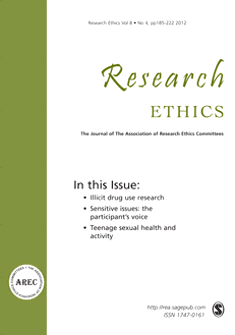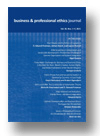
Neuroethics
Scope & Guideline
Addressing Contemporary Challenges in Neuroethics
Introduction
Aims and Scopes
- Neuroethics and Policy:
Explores the ethical, legal, and social implications of neurotechnologies and neurointerventions, addressing issues such as mental privacy, consent, and the governance of brain data. - Psychedelic Research and Therapy:
Investigates the moral and ethical considerations surrounding the use of psychedelics in therapeutic contexts, particularly in relation to mental health and existential concerns. - Consciousness and Identity:
Examines philosophical questions related to consciousness, identity, and the self, particularly in the context of emerging technologies like brain organoids and neuroimplants. - Moral Responsibility and Neurotechnology:
Analyzes the intersection of neuroscience and moral philosophy, especially how advancements in neurotechnology impact concepts of free will, blame, and moral responsibility. - Neurodiversity and Social Justice:
Focuses on the ethical implications of neurodiversity, addressing issues related to autism, mental health, and the societal responsibilities toward diverse neurological conditions.
Trending and Emerging
- Neurorights and Mental Privacy:
There is a growing emphasis on the concept of neurorights, which advocates for the protection of mental privacy and the right to cognitive autonomy in the face of advancing neurotechnologies. - Psychedelic-Assisted Therapies:
Psychedelics are increasingly recognized for their potential therapeutic benefits, leading to expanded discussions on their ethical use, particularly in palliative care and existential distress. - Ethical Implications of Brain Organoids:
Research on brain organoids has surged, raising complex ethical questions about consciousness, moral status, and the implications for animal research ethics. - Neurotechnology and Criminal Justice:
The intersection of neurotechnology and criminal justice is gaining traction, particularly in exploring how neuroscience can inform concepts of responsibility and rehabilitation. - Diversity and Inclusion in Neuroethics:
There is an increasing focus on addressing racial and social disparities in access to neurotechnologies, emphasizing the need for ethical frameworks that promote inclusivity and equity.
Declining or Waning
- Traditional Neuroethics Frameworks:
There appears to be a waning focus on conventional frameworks of neuroethics that strictly separate ethical considerations from empirical research, as newer interdisciplinary approaches emerge. - Neuroenhancement in Sports:
Interest in the ethical implications of neuroenhancement specifically within sports contexts, such as neuro-doping, has decreased, possibly due to evolving discussions on broader ethical implications across various fields. - Philosophical Debates on Free Will:
While foundational discussions on free will remain important, there is a noticeable reduction in publications strictly debating deterministic views as newer frameworks that incorporate neuroscience into ethics gain traction. - Animal Research Ethics:
Discussions specifically focused on the ethics of animal research in neuroscience have diminished, likely overshadowed by more pressing concerns regarding human neuroethics and personal autonomy.
Similar Journals

Research Ethics
Transforming Ethical Challenges into Scholarly Dialogue.Research Ethics is a leading journal published by SAGE Publications Inc that fosters scholarly discourse at the intersection of ethical considerations and research practices. As an Open Access platform since 2018, it ensures that critical insights on ethical dilemmas faced by researchers are freely available to a global audience, significantly enhancing its reach and impact. With an impressive impact factor reflected in its Q1 and Q2 rankings in Philosophy and Education respectively for 2023, this journal occupies a vital space for researchers and professionals aiming to navigate the complex ethical landscape of contemporary research. As indicated by its strong Scopus rankings, falling into the 95th percentile in Arts and Humanities (Philosophy) and 77th percentile in Social Sciences (Education), Research Ethics is essential for anyone interested in contributing to or understanding ethical practices in research. The journal encompasses a broad scope, encouraging submissions that explore diverse aspects of research ethics, promoting high standards and integrity across disciplines. Join a community dedicated to advancing ethical research methodologies and contributing meaningfully to the dialogue that shapes the future of moral practices in academia.

THEORETICAL MEDICINE AND BIOETHICS
Fostering Insightful Dialogues on Bioethical Dilemmas.THEORETICAL MEDICINE AND BIOETHICS, published by SPRINGER, is an esteemed journal dedicated to exploring the complex intersections of medicine, ethics, and law. With its ISSN 1386-7415 and E-ISSN 1573-1200, this journal serves as a vital platform for scholars, practitioners, and students interested in the ethical implications of medical practices and innovations. Although it currently holds a Q4 impact factor in the categories of Issues, Ethics and Legal Aspects and Medicine (Miscellaneous) as of 2023, its relevance is amplified by its commitment to fostering critical discourse in a rapidly evolving field. The journal features a diverse range of articles that address profound ethical dilemmas in healthcare, making it a significant resource for contemporary research from 1997 to the present. As an open-access journal, it ensures that cutting-edge knowledge is readily available, inviting contributions that challenge conventional thought and advance the field of bioethics.

PHILOSOPHICAL STUDIES
Advancing the Frontiers of Philosophical ThoughtPhilosophical Studies, published by Springer, is a prestigious peer-reviewed journal that stands at the forefront of philosophical discourse since its inception in 1950. With ISSN 0031-8116 and E-ISSN 1573-0883, this journal has firmly established itself as a critical platform for disseminating high-quality research in philosophy, positioned in the Q1 category for Philosophy with an impressive Scopus rank of #73 out of 806, placing it in the 90th percentile of its field. Although it does not offer Open Access, the journal’s rigorous selection process ensures that only the most relevant and impactful studies are published, making it an invaluable resource for philosophers, academics, and students alike. With a commitment to advancing philosophical inquiry and fostering a vibrant scholarly community, Philosophical Studies continues to attract contributions that challenge prevailing paradigms and explore new dimensions in philosophical thought. The journal's scope encompasses a wide array of topics within philosophy, encouraging interdisciplinary engagement and dialogue.

Journal of Psychedelic Studies
Connecting Researchers, Clinicians, and Students in Psychedelic StudiesJournal of Psychedelic Studies is a pioneering publication dedicated to advancing the interdisciplinary exploration of psychedelics, their therapeutic potentials, and their historical and cultural significance. Published by AKADEMIAI KIADO ZRT in Hungary, this journal has rapidly established itself within the academic community since its inception in 2019, achieving impressive rankings across various disciplines, including a Q1 category in Anthropology and strong placements in Clinical Psychology and Health (social sciences) in 2023. With a commitment to open access dissemination, the journal promotes unrestricted access to research findings, fostering an inclusive environment for researchers, clinicians, and students alike. It is an essential resource for those interested in the intersection of mental health, pharmacology, and social sciences, providing a platform for innovative research and critical discourse. As the study of psychedelics continues to gain momentum globally, the Journal of Psychedelic Studies serves as a vital conduit for scholarly insights that shape the future of this evolving field.

EUROPEAN JOURNAL OF PHILOSOPHY
Advancing philosophical discourse for over three decades.European Journal of Philosophy, published by Wiley, stands as a premier academic journal in the field of philosophy, recognized for its rigorous scholarship and impactful contributions. With an impressive Q1 ranking in Philosophy as noted in the 2023 category quartiles, the journal places within the top echelons of its field, reflecting its commitment to advancing philosophical discourse. Covering a broad spectrum of philosophical topics, the European Journal of Philosophy features peer-reviewed articles that engage both contemporary discussions and foundational theories, making it an invaluable resource for researchers, professionals, and students alike. The journal's accessibility to readers in the United Kingdom and beyond ensures a wide dissemination of knowledge, fostering an international dialogue that enriches philosophical inquiry. With a convergence of intellectual contributions since 1993, the journal continues to push the boundaries of philosophical thought into 2024 and beyond.

Diametros
Advancing philosophical discourse for all.Diametros is a prominent open-access journal published by the Jagiellonian University, Institute of Philosophy, committed to advancing scholarly discourse in the field of philosophy. Since its inception in 2004, this innovative journal has provided a platform for rigorous academic research and critical studies, contributing significantly to the philosophical landscape. With an impressive Scopus rank of #224 out of 806 in the Arts and Humanities category and a respectable Q2 quartile ranking, Diametros reflects a robust engagement with contemporary philosophical debates and issues. The journal features a diverse array of articles that encourage interdisciplinary dialogue and exploration, aiming to foster a vibrant community of researchers, professionals, and students alike. As an open-access publication, Diametros ensures that research is freely available to all, enhancing visibility and impact within the global academic community. With a commitment to quality and accessibility, the journal continues to play an essential role in shaping philosophical inquiry both in Poland and beyond.

BUSINESS & PROFESSIONAL ETHICS JOURNAL
Advancing the Dialogue on Business IntegrityBUSINESS & PROFESSIONAL ETHICS JOURNAL, published by the Philosophy Documentation Center, serves as a premier platform for rigorous research and discourse in the realms of ethics surrounding business practices and professional conduct. Since its inception in 1979, this journal has consistently contributed to the field, encompassing vital discussions that influence ethical standards in business and economics. With a rich historical arch spanning various converged years, it has evolved to become a key resource, currently enjoying a Q4 ranking in Business and International Management and Q4 in Economics and Econometrics in 2023, alongside a strong standing in the philosophy category. While being non-open access, the journal remains an essential reference point for academics and practitioners seeking to navigate the complex ethical landscapes of their fields. As the discourse around business ethics gains importance, the journal positions itself as a critical venue for sharing innovative insights and solutions, making it an invaluable resource for researchers, professionals, and students alike.

Ethics & Bioethics
Bridging disciplines to enhance understanding in bioethics.Ethics & Bioethics is a vital interdisciplinary journal published by DE GRUYTER POLAND SP Z O O, focusing on the ethical dimensions of biological and medical practices. Since its transition to an Open Access model in 2016, the journal has become more accessible, promoting the dissemination of high-quality research to a broader audience. Based in Warsaw, Poland, this journal contributes significantly to the discourse on ethical practices in health policy, education, and philosophy, as evidenced by its impressive Scopus rankings, including a Q1 quartile in Philosophy. Covering a wide spectrum of ethical issues and dilemmas faced in contemporary society, Ethics & Bioethics provides a platform for researchers, professionals, and students to engage with cutting-edge scholarship aimed at advancing understanding and fostering dialogue in the ever-evolving landscape of bioethics. With a commitment to rigorous peer review and academic integrity, this journal is pivotal for those seeking to enhance their knowledge and contribute to the field.

Turkish Journal of Business Ethics
Advancing Integrity and Responsibility in EntrepreneurshipTurkish Journal of Business Ethics, published by the IGIAD-Turkish Entrepreneurship & Business Ethics Association, serves as a critical platform for researchers, professionals, and students interested in the intersection of business practices and ethical principles within a Turkish context and beyond. The journal, with ISSN 1308-4070 and E-ISSN 2149-8148, aims to publish high-quality, peer-reviewed research that addresses contemporary issues in business ethics such as corporate governance, social responsibility, and ethical decision-making in entrepreneurship. While specific impact factor data and HIndex may not be disclosed, the journal aspires to contribute significantly to the scholarly dialogue in the field of business ethics, making it a valuable resource for academics seeking to advance their knowledge and understanding of ethical frameworks in business. This open-access journal ensures broad dissemination of its findings, fostering a global discourse on pressing ethical challenges faced by businesses today.

JOURNAL OF CONSCIOUSNESS STUDIES
Bridging Philosophy and Science in the Study of Consciousness.JOURNAL OF CONSCIOUSNESS STUDIES, published by IMPRINT ACADEMIC, is a leading multidisciplinary platform dedicated to the exploration of consciousness, philosophy, and cognitive science. Established in 1996, this journal has garnered recognition within several academic categories, achieving a 2023 Q1 classification in Philosophy and a Q2 ranking in Psychology and Ecology, among others. With an emphasis on innovative perspectives and interdisciplinary research, the journal aims to foster dialogue among researchers, professionals, and students who share a keen interest in understanding the complex nature of consciousness and its implications across various fields. Though it does not operate under an open access model, the journal provides comprehensive content that is vital for advancing scholarly discourse. With significant influence reflected through its Scopus rankings and a commitment to high-quality research, the JOURNAL OF CONSCIOUSNESS STUDIES remains an essential resource for those engaged in the ever-evolving study of consciousness.